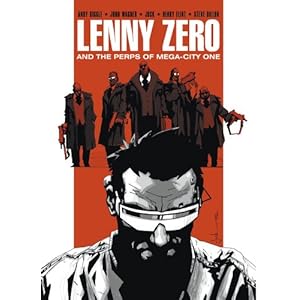
I really don't envy anybody's job in trying to introduce Americans to the sprawling world of Judge Dredd. (This collection is among the titles co-published with Simon & Schuster for the American market.) Start anywhere in the present day, and much of the subtleties of such long-running subplots are lost. Start at the beginning and you're looking at something that really takes a lot of effort, primitive stories told in a visual language with which most Americans are unfamiliar. Dredd is always a work in progress, and his stories have leaked out into dozens of other short-run series with other lead characters, set in his universe with rules most familiar to readers who already know Dredd fairly well.
The godawfully titled Lenny Zero and the Perps of Mega-City One collects two of these short series, along with three installments of Dredd that feature a recurring criminal, wrapping up with a fourth memorable character starring in a two-part Dredd tale by Robbie Morrison and Henry Flint. There is some very good stuff in this collection, but as a book, it is really difficult to embrace.
First up are the three stories of Lenny Zero by Andy Diggle and Jock. These are hugely fun little adventures about a clever undercover judge who decides that a life of crime is too darn appealing and sets about taking down the assets of a gangster. They're followed by the first three of four stories for Bato Loco by Gordon Rennie and Simon Coleby. Our "hero" here is a weaselly little con artist and very minor link in various organized crime chains who manages more last-second lucky breaks than anybody deserves.
Unfortunately, while these are both fun little series and, as they are too short to be realistically collected any other way, it's good to see them finding space in an anthology like this, they are also the clear standouts of the material, and the rest of the book just doesn't measure up. Three Dredd episodes featuring the villain Slick Dickens follow these, and it won't take a very trained eye to realize that they all have the same plot, and not a particularly good one. The less said about "Street Fighting Man," with its sentimental underpinning and risible, out-of-character climax, the better, although it's certainly drawn well by Henry Flint.
The problems are just huge, across the board, despite the quality of the ten or so episodes that form the six Lenny Zero and Bato Loco stories. These are good stories, but this presentation doesn't make any sense to me. 160 pages simply isn't enough to really dig into the fun of Mega-City One's criminal culture. Slick Dickens is stunningly out of place among the violence and mayhem, and would have worked better as a single episode coda, suggesting how the criminal class of the city would like things to be. A larger book that incorporated, say, some of the classic Mega-Rackets of the early 1980s, or the completely brilliant "Flood's Thirteen" caper from five or six years ago, would have fit much better thematically.
While 160 pages were not enough to really dig into the material that could have been included, most of the stories here are still entertaining, and they're presented with Rebellion's expected attention to detail and excellent reproduction. Curiously, this book retains the interior design elements of the rest of their extensive line, but neither the front cover nor the spine match anything else from the publisher, an aggravating oversight that will annoy completists, most of whom probably have most of this material in other editions already. Recommended, therefore, for new readers only.
No comments:
Post a Comment